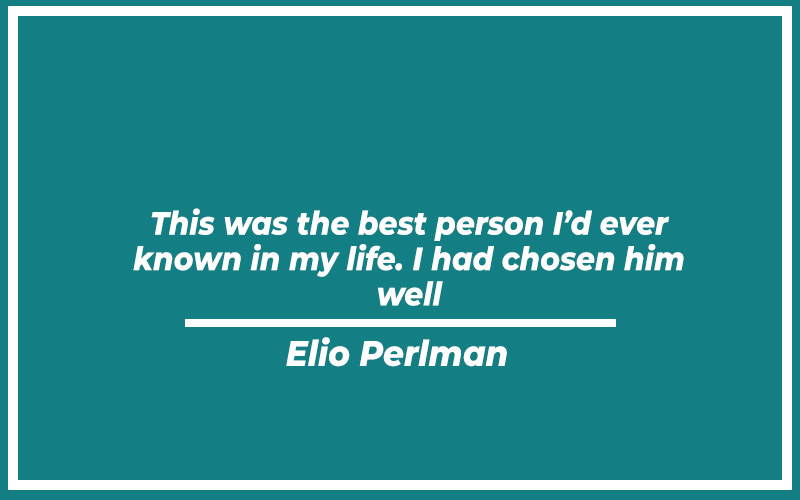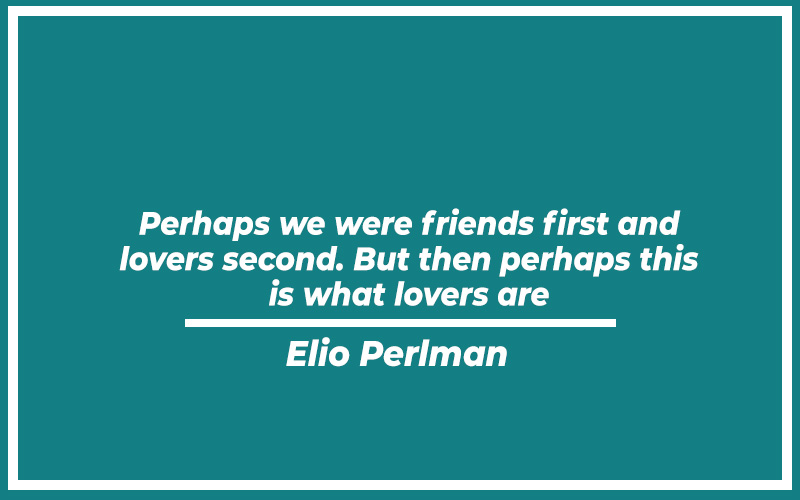Summer romances can be fleeting, yet unforgettable. The film “Call Me By Your Name” captures that feeling beautifully.
Set in sun-drenched Italy during the 1980s, the movie follows Elio, a teenager yearning for connection. He finds it in Oliver, his father’s charming research assistant.
Their blossoming relationship explores themes of self-discovery, first love, and the bittersweet pangs of growing up.
Call Me By Your Name Quotes

“Call me by your name and I’ll call you by mine.” – Oliver
This Call Me by Your Name quote highlights the intense intimacy and deep connection between Elio and Oliver. By exchanging names, they are essentially exchanging identities, signifying their union and blurring the boundaries between them.
The phrase encapsulates the theme of identity and intimacy that runs throughout the narrative, showcasing how love can transform and unite individuals in profound ways.
Also Read: Quotes about Immigration (with Explanation)
“Don’t let him be someone else when he’s away. Don’t let him be someone I’ve never seen before. Don’t let him have a life other than the life I know he has with us, with me.” – Elio Perlman
Elio Perlman’s plea reveals his deep-seated fear of change and loss, particularly the transformation of a loved one into a stranger.
This quote speaks to the universal fear of losing connection with those we love, highlighting the possessive yet vulnerable nature of deep emotional bonds.
“The light of my eyes, I said, light of my eyes, light of the world, that’s what you are, light of my life.” – Elio Perlman
Here, Elio uses poetic language to express the profound impact Oliver has had on his life.
The repetition emphasizes the centrality of Oliver to Elio’s existence, illustrating how love can elevate someone to become the core of another’s world, bringing light and meaning to their life.
“Something unexpected seemed to clear away between us, and, for a second, it seemed there was absolutely no difference in age between us, just two men kissing, and even this seemed to dissolve, as I began to feel we were not even two men, just two beings.” – Elio Perlman
This quote captures a moment of pure connection, transcending social constructs like age and gender.
It underscores the novel’s exploration of identity and attraction, emphasizing the deep, elemental bond that can form between individuals when external labels and boundaries are stripped away.
“Oliver was Oliver,’ I said, as if that summed things up. ‘Parce que c’était lui, parce que c’était moi,’ my father added, quoting Montaigne’s all-encompassing explanation for his friendship with Etienne de la Boétie.” – Elio Perlman
By referencing Montaigne, Elio and his father articulate a profound, ineffable connection that defies easy explanation—suggesting that some relationships are so deeply rooted in mutual understanding and identity that they are beyond words.
This analyses further explore the intricate themes of memory, identity, and emotional depth in the movie.
“What is life without this? which was why, in the end, it was I, and not he, who blurted out, not once, but many, many times, You’ll kill me if you stop, because it was also my way of bringing full circle the dream and the fantasy, me and him, the longed-for words from his mouth to my mouth back into his mouth, swapping words from mouth to mouth, which was when I must have begun using obscenities that he repeated after me, softly at first, till he said, ‘Call me by your name and I’ll call you by mine’…” – Elio Perlman
This intense, passionate exchange between Elio and Oliver encapsulates the novel’s central theme of identity and deep connection.
It highlights the transformative power of love and desire, where the boundaries between individuals blur into a shared existence.
“If it makes you feel any better, I don’t think either of us ever will be ready to speak of them as strangers,” I said. – Elio Perlman
This quote speaks to the lasting impact of significant relationships, suggesting that some connections are so profound that they permanently alter our lives.
It addresses the difficulty of relegating deeply intertwined lives to mere memories or stories, reflecting on the lasting emotional residue that such relationships leave behind.
“And on that evening when we grow older still we’ll speak about these two young men as though they were two strangers we met on the train and whom we admire and want to help along. And we’ll want to call it envy, because to call it regret would break our hearts.” – Elio Perlman
In this reflective passage, Elio anticipates the pain of memory and the transformation of personal history into narrative.
It explores the human tendency to reshape painful or complex emotions like regret into more manageable forms like envy, highlighting the protective narratives we construct around our past experiences to cope with loss and change.
Later that evening in my diary, I wrote: I was exaggerating when I said I thought you hated the piece. What I meant to say was: I thought you hated me. I was hoping you’d persuade me of the opposite—and you did, for a while. Why won’t I believe it tomorrow morning?” – Elio Perlman
This introspective diary entry from Elio captures his insecurities and the transient reassurances in his relationship with Oliver.
The oscillation between doubt and brief moments of confidence reflects the fragile nature of self-esteem that depends heavily on external validation, a common theme in coming-of-age narratives.
“Do I like you? I worship you.” – Elio Perlman
Elio’s declaration of worship towards Oliver highlights the intensity and almost idolatrous nature of his affection. This quote emphasizes the depth of his emotional investment and the extent to which love can elevate another person to a pedestal.
It explores the idealization that often accompanies first loves, especially those that are as intense and formative as Elio’s with Oliver.
“If there is any truth in the world, it lies when I’m with you, and if I find the courage to speak my truth to you one day, remind me to light a candle in thanksgiving at every altar in Rome.” – Elio Perlman
Here, Elio speaks to the profound sense of truth and authenticity he experiences with Oliver. The promise to light a candle in thanksgiving symbolizes a sacred commitment to honor this truth.
It suggests a blend of spiritual reverence with personal revelation, underscoring the novel’s exploration of love as a transformative, almost holy experience.
“What I wanted to preserve was the turbulent gasp in his voice which lingered with me for days afterward and told me that, if I could have him like this in my dreams every night of my life, I’d stake my entire life on dreams and be done with the rest.” – Elio Perlman
This quote delves into Elio’s desire to capture and preserve a fleeting moment of intimacy, highlighting his longing and the pain of its ephemeral nature.
It reflects the intense emotional states that love can induce, where reality becomes secondary to the vividness of dreams and memories.

“This was the best person I’d ever known in my life. I had chosen him well.” – Elio Perlman
Reflecting on his relationship with Oliver, Elio acknowledges the profound impact Oliver has had on his life. This quote underscores a recognition of deep compatibility and the significance of choosing someone who profoundly resonates with one’s soul.
It celebrates the beauty of finding someone who deeply influences and shapes one’s life perspective.
“How I admired people who talked about their vices as though they were distant relatives they’d learned to put up with because they couldn’t quite disown them.” – Elio Perlman
Elio’s observation here speaks to the human tendency to personify and somewhat affectionately regard one’s flaws.
This quote offers insight into his introspective and somewhat forgiving view of human imperfections, suggesting a mature acceptance of the complex nature of personality and behavior.
“Think of the pain before the pain.” – Elio Perlman
This enigmatic statement invites contemplation of anticipatory grief—the pain felt in anticipation of a loss not yet happened.
It captures a profound aspect of human emotion, where the dread of future sorrow can be as impactful as the sorrow itself, emphasizing the novel’s deep dive into the nuances of human emotional experiences.
“He came. He left. Nothing else had changed. I had not changed. The world hadn’t changed. Yet nothing would be the same. All that remains is dreammaking and strange remembrance.” – Elio Perlman
This quote encapsulates the transformative impact of Oliver’s visit on Elio’s life. Although outwardly everything appears unchanged, Elio’s inner world has been irreversibly altered.
The mention of “dreammaking and strange remembrance” suggests a lingering, almost haunting presence of the past, emphasizing the deep emotional imprint left by intense, fleeting relationships.
“Whatever happens between us, Elio, I just want you to know. Don’t ever say you didn’t know.” – Oliver
Oliver’s words here underscore the theme of explicit mutual acknowledgment in their relationship. This quote is about the importance of honesty and the recognition of the profound emotional stakes involved.
It highlights the novel’s exploration of vulnerability and the need for clarity in the midst of complex emotional and sexual dynamics.
“I may have come close, but I never had what you had. Something always held me back or stood in the way.” – Oliver
Here, Oliver reflects on the barriers—both external and internal—that prevent one from fully embracing love or happiness.
This admission reveals a poignant sense of regret and perhaps envy, adding layers to his character as someone aware of his limitations and the missed opportunities they create.
“In your place, if there is pain, nurse it, and if there is a flame, don’t snuff it out, don’t be brutal with it.” – Elio’s Father
Elio’s father advises embracing rather than denying one’s emotional pain or passion. This wisdom speaks to the novel’s broader theme of emotional authenticity and the courage to confront one’s feelings directly.
It serves as a guiding principle for Elio, suggesting that personal growth often comes from preserving rather than extinguishing the intensity of our experiences.
“At one hundred, surely you learn to overcome loss and grief—or do they hound you till the bitter end?” – Elio Perlman
This rhetorical question posed by Elio reflects on the enduring nature of grief and loss. It highlights the novel’s exploration of time’s passage and its insufficient power to heal all wounds.
This quote suggests that some emotional experiences might remain unresolved, challenging the notion that time naturally brings closure.
“I wish I had one friend I wasn’t destined to lose.” – Elio Perlman
Expressing a universal fear of impermanence in relationships, this quote from Elio highlights his struggle with the transient nature of human connections, especially poignant in the context of his fleeting relationship with Oliver.
It encapsulates a yearning for stability and permanence amidst the inevitable changes that life brings.
“If there is any truth in the world, it lies when I’m with you.” – Elio Perlman
In this declaration, Elio articulates a profound sense of authenticity and truth found in his relationship with Oliver.
This quote underscores the theme of finding one’s true self in the presence of another, suggesting that the deepest truths about ourselves are often revealed in the context of our most intimate relationships.
“I suddenly realized that we were on borrowed time, that time is always borrowed, and that the lending agency exacts its premium precisely when we are least prepared to pay and need to borrow more.” – Elio Perlman
This poignant reflection by Elio encapsulates the fleeting nature of time and love in “Call Me by Your Name.” The metaphor of borrowed time highlights the transient, precious moments between Elio and Oliver, suggesting that each moment is a debt to be repaid later, often when least expected or desired.
This awareness brings a bittersweet urgency to their relationship, underscoring the inevitable pain that accompanies the joy of their summer romance.
“Most of us can’t help but live as though we’ve got two lives to live, one is the mockup, the other the finished version, and then there are all those versions in between.” – Elio Perlman
Elio’s introspection about the dual lives we lead speaks to the core of human experience. This quote reflects the inner conflict between our ideal selves and the reality of who we are, emphasizing the continuous process of self-creation and modification.
In the context of the novel, it reflects the characters’ struggles with identity and the facade they present to others as they navigate their desires and societal expectations.
“When you’re just ready to shut the door of the taxi and have already said goodbye to everyone else and there’s not a thing left to say in this life, then, just this once, turn to me, even in jest, or as an afterthought, which would have meant everything to me when we were together, and, as you did back then, look me in the face, hold my gaze, and call me by your name.” – Elio Perlman
This quote captures a moment of longing and the profound connection between Elio and Oliver. It’s about the lasting impact of a brief relationship and the deep emotional imprint one person can leave on another.
The act of calling someone by your own name as a form of intimate connection and mutual recognition is central to their relationship and the story’s theme.
“We rip out so much of ourselves to be cured of things faster than we should that we go bankrupt by the age of thirty and have less to offer each time we start with someone new. But to feel nothing so as not to feel anything—what a waste!” – Elio Perlman
This reflects the emotional sacrifices people make to avoid pain, often at the cost of their ability to feel deeply.
Elio critiques the self-preservation that leads to emotional insolvency, advocating instead for embracing feelings fully, even when they lead to pain, underscoring the novel’s exploration of the depths of human emotion and the consequences of trying to control it.

“Perhaps we were friends first and lovers second. But then perhaps this is what lovers are.” – Elio Perlman
Elio’s reflection on the nature of his relationship with Oliver suggests that the strongest romantic connections stem from friendship.
This quote challenges traditional notions of romantic relationships by proposing that the lines between friendship and love can blur, creating a profound bond that is as deep as it is complex.
“Smells and sounds I’d grown up with and known every year of my life until then but that had suddenly turned on me and acquired an inflection forever colored by the events of that summer.” – Elio Perlman
Elio’s sensory memories of that summer with Oliver illustrate how deeply our experiences are tied to the senses.
This quote explores how profoundly a significant emotional experience can alter our perception of familiar sights, sounds, and smells, imbuing them with new meanings that resonate with our emotions and memories.
“I had never been able to admit to myself how happy Oliver had made me the day he’d swallowed my peach. Of course, it had moved me, but it had flattered me as well” – Elio Perlman
This quote touches on a particularly intimate and vulnerable moment between Elio and Oliver, reflecting the complex emotions of gratification and recognition.
It highlights a pivotal scene where the personal becomes profound, encapsulating the novel’s exploration of desire, shame, and the interplay between the two.
Also Read: Rich Dad, Poor Dad Quotes (with Explanation)
Final Thoughts
Elio and Oliver’s story may be a summer romance, but the lessons it teaches about love, loss, and living in the moment.
So next time you hear a song from the 80s or feel the warmth of the summer sun, you might just be reminded of Elio and Oliver’s unforgettable connection by the pool, forever etched in cinematic history.

